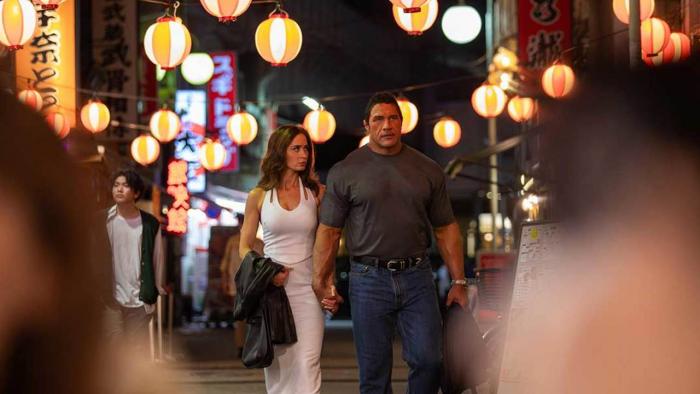By Kayleigh Donaldson | Film | October 3, 2025

Before MMA and the UFC were dominated by right-wing sycophancy and podcast bros, it was the no-limits niche division of professional fighting long overshadowed by the soapy theatrics of the WWE. One of its earliest stars was Mark Kerr, a trained wrestler who was beloved for his merciless attacks. But, as with many an athlete, his career was full of highs and lows, prescription painkiller addiction, and the changing nature of the sport. A tempestuous relationship with his fiery girlfriend didn’t help matters, nor did his own internal battles with self-loathing and anger.
This all sounds like the setup to, let’s be honest, 90% of fighting biopics. Boxing in particular has proven to be a highly cinematic sport thanks to its mixture of balletic movement and bone-crunching brutality. These are narratives that practically beg for the biographical treatment, although this genre’s middlebrow confines often do it no favours. At TIFF this year, we already had Christy, another fighting biopic that took another fascinating and very cinematic true story and made it as generic as possible. The Smashing Machine fares better thanks to its director’s indie flair, but even it cannot fully escape the narrow boundaries of the ring.
Benny Safdie won Best Director at the Venice Film Festival for his work here, which is suitably flashy without being incomprehensible. He gives the film that late ’90s VHS grit to evoke the near past of the previous decade. There’s a dingy quality to it all, from the tacky fireworks and electric guitar national anthems of the ring to the run-down backrooms where the fighters train and contemplate. There’s nothing slick here, certainly not the violence. Every punch or knee to the face is loud and bloody. For a film relying on the branding of UFC to sell itself, The Smashing Machine is a pretty thorough advert for the abolition of the entire sport.
Much has already been said about how this film exists, at least in part, to elevate Dwayne Johnson to the status of character actor and potential Oscar winner. We’ve been saying it from the moment the project was announced. How could we not? Here is arguably the most ambitious man in Hollywood, a performer whose every move is a tactical choice to make himself into a megastar, and now he’s headlining an A24 biopic? Johnson’s work here will help to diffuse some of that skepticism.
Finally, we get to see him stretch himself after years of being the Perfect version of himself. Granted, this isn’t exactly miles out of his wheelhouse, but we do get Johnson in real Actor Mode for the first time in a while. As Mark Kerr, he is obviously physically imposing, but he’s most intriguing in the ways he swipes from kindness to barely contained fury. Kerr is the kind of guy who is unflinchingly polite to everyone he meets and talks about his ‘tummy aches’, but when he’s on the verge of snapping, that smile gets a little too wide, his eyes a tad darker. Kerr is a man obsessed with self-control, and seeing Johnson navigate the tight paths of this particular brand of macho branding is where he really shines. Will he get nominated for it? My guess is yes. It’s a weak year and his story is great, although the performance itself is far from remarkable.
Safdie has clearly seen a lot of fighting biopics and wants to avoid as many of those well-punched tropes as he can, even if Kerr’s story invites so many of them. We don’t get long scenes of Kerr shooting up the opiates he needs to stave off chronic pain, or flashbacks to his youth. There’s no meet-cute between him and Emily Blunt’s “every girlfriend in a boxing movie from the SNL sketch” character. When his addiction becomes too big to ignore, his nadir happens off-screen. The Smashing Machine only covers three years of his life, focusing largely on his time in the Japanese fighting circuit and the contrast between his approach to his job pre- and post-rehab. It’s a noble approach from Safdie, who also wrote the script, but it’s undeniable that something feels missing.
There’s a lack of connective tissue between many scenes that leaves the narrative feeling disparate. The relationship between Kerr and his girlfriend is fiery and destructive, yet we don’t feel the loss of it when it goes downhill. His friendship with fellow fighter and sometime-rival Mark Coleman (Ryan Bader, an MMA fighter who shows some real dramatic chops in his acting debut) has glimmers of authenticity, but not much depth. The more it tries to run away from the cliches of the biopic, the more it finds itself restricted by their necessity. It’s a shame because it feels like there’s a lot of unmined territory in this story regarding ideas of masculinity and how the entire UFC brand, on the verge of becoming an indomitable empire, is dependent on broken bodies and ravaged minds. The Smashing Machine doesn’t glory in this world of mandated violence, but its ambivalence could have used some stronger roots.
The Smashing Machine had its North American premiere at the 2025 Toronto International Film Festival. It opens in theatres on October 3rd.